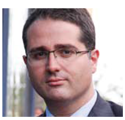Talking ‘digital’ business – Osborne Clarke
Lawyers are no longer just supplementing existing methods of practice with digital technologies, but adopting a new approach to helping their clients
Digital technologies have become so intertwined with the traditional economy, they now require a type of lawyer capable of meeting marketplace needs, says Rafael García del Poyo, Digital Business Law Partner at Osborne Clarke in Madrid. This includes everything from telecommunications, intellectual and industrial property, e-commerce and hardware acquisition to outsourcing, cloud computing and data protection.
“When you talk about information technologies, you are talking about something that is transversal to many productive processes and, thus, to many areas of the law,” says García del Poyo. “This means that lawyers are constantly faced with IT law whenever dealing with any company or industry.”
Knowing your role
The fact that the word ‘digital’ pretty much covers everything in business, it is imperative that lawyers determine the exact remit of their role in this new way of doing business, says García del Poyo.
He stresses that he doesn’t see himself as an ‘IT geek’, but a normal lawyer who just happens to be a specialist in EU and international commercial law related to the sector of information technologies. “But if we are talking about a person who is going to be dismissed because they were found sending inappropriate emails, then that is a matter for labour law and I try to provide the client with the most appropriate legal and human resources to solve that particular contingency. It becomes a matter of trust.”
However, García del Poyo admits that his approach and focus in the digital economy doesn’t just need to be different, it needs to be bespoke – every time. “We never commoditise business for our clients, because each one is different and they come to us with totally different needs – some are multinationals and others are start-up companies, but the common ground is that they all require legal advice.”
That’s why for lawyers, the digital economy is also prompting new ways of working so that they can fit into the existing set up, whether it be a multinational wanting an active team member fully engaged in all aspects of the business, or small and medium-sized enterprises (SMEs) needing legal advice to set up certain things related to, or with, a digital business, explains García del Poyo.
“While big companies are looking for lawyers that are productive and business-orientated enough to accompany them in their decisions,” he explains, “SMEs might just come to you wanting advice on being more compliant with the law as they realise that they will be more competitive and valuable if they do so”.
The right communication
Identifying long-term opportunities within the digital economy therefore requires creativity on the lawyer’s part, but often they need look no further than their current clients. “We like to build a consistent portfolio of digital business clients, which also includes start-up companies,” says García del Poyo, “so we accompany them mentoring and providing legal assistance until they reach a certain degree of maturity that allows us to charge legal fees according to their business achievements. Legal compliance certainly adds to the market value of a company but this is particularly true in the global digital economy.”
Anticipating the needs of the multinational comes down to providing short and precise bursts of advice on certain matters that facilitate their business interests at the exact moment they need it, he adds. “At the end of the day, they trust you and your legal criteria and sometimes do not need long legal reports but just to know what’s going on in the legal arena. So you have to communicate legal advice in a way that is useful to each business purpose.”
Lawyers have been too conventional in the past and now we have to be more open-minded, concludes García del Poyo. “I consider myself a traditional lawyer that is also capable of understanding each clients’ business as a part of that legal advice. I see myself as a part of the complex decision-making and advice giving process, and a member of the business team, not just a mere spectator.”
Against a backdrop of continual change, lawyers in this digital economy must therefore not only focus on the client’s needs and development, but also draw on their own experience to go beyond the conventional and become a legal expert who understands business.












